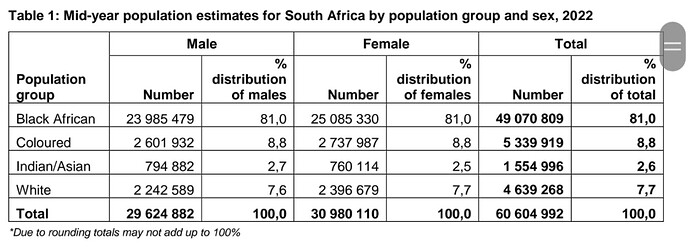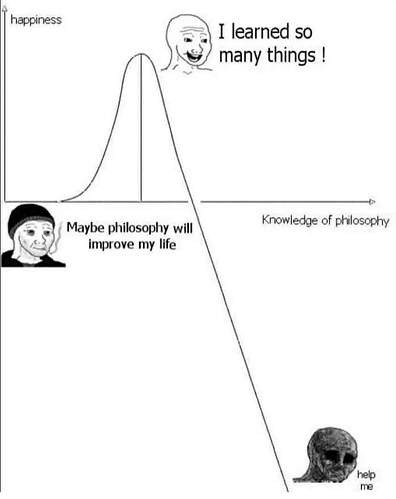O pfok nee!!!
Think of the kindest, strongest, nicest no-nonsense female person you know, and think about how she would run things if she had the majority’s support.
Most of the time you need testosterone to get things started, going. Once it is, has started, the rest of the time you need estrogen to keep it functioning properly, as testosterone would just cause another fight sooner rather than later.
Title needs 10 characters so… “,etc” ![]()
Thank you Sire! Much better title there.
See that is what I said I would think on this first. The problem with most of the political elite are that they fall somewhere on the Covert Narcissists, Sociopaths and Psychopath spectrums. They are there because they out competed everyone else on those scales.
Its not that they are overtly on that path, but once in power, those traits take over. The self entitlement makes it worse. No matter how benevolent they are when starting out, they almost always stop being the servants… becoming the elites.
Groetnis
So back in 2002, when I was doing my honours degree, someone decided that us science students really should get a wake up call, remove the chip from our shoulders, fix our thinking, or whatever you want to call it, and we had to take a course called “Philosophy for science students”.
That really was a wake-up call. I remember how we did Logical Positivism the one day, and it was the usual stuff we are all used to: Science was king, if you could not science your way out of the problem, it wasn’t a problem worth worrying about. Basically, science was the sole arbiter of what was meaningful.
Then my head exploded the next day, as we learned that LP is a doomed proposition because it is not a scientific proposition in itself, and therefore by it’s own claims, it is meaningless. LP is the acid that destroys its own foundations. It is, in philosophical speak, self defeating.
That was the day my slow descent into Monism was halted, and I found myself, almost like Donkey on that rickety bridge in the first Shrek movie, declaring that I want go go back because I know THAT END is SAFE!
Shortly afterwards I started reading a lot of CS Lewis, and in his Chronicles of Narnia there is this striking event (in The Silver Chair, probably my favourite book in the series), where the Puddleglum character, in his usual gloomy depressing way explains to the Witch (of the underworld) that if this is the best the real world has, he’s fine with dying while looking for the overworld…
Which is why, for the most part, I’ll rather be happy and wrong, than unhappy and right.
![]()
Sooo then, in our democracy (hmmm wonder what the latest definition of that looks like) how do you get an unwilling population to buy into your latest attempt to gain more power, or, how do you get them to accept your vision of what is good?
Oh easy, declare an emergency. Look at what happened in the recent past, and from the command councilks perspective, just how effective that was….
So what is the next emergency we can declare that will give more control and allow new laws or dictates to be issued….
Groetnis
Not much of a philosophy buff, myself, but have known several chaps who were into all that dregs of last century’s post-post-toasties stuff, so whenever I hear “interrogating the text” or “unpacking the hidden power struggles inherent to…” or “problemitising” or or or this next image pops into my head…
Yeah, modernism, and then post-modernism. And then you have all the various philosophers, the ones we learned about (Popper, Kuhn, Lakatos), a little bit of Hume (he seemed terribly out of place with the 20th century guys), and then I have this friend who actually studied Philosophy for real and according to him, if you really want to go off the deep end, read Foucault…
For me, it is simple. Any philosophy that requires me to deny that there could be any meaning in the combined endeavour of life and all that it entails (including philosophy itself) is self-defeating and therefore almost certainly false. From that follows that meaning itself is apparently an objective value, something that exists even outside of the humans that always argue about it. And that entails certain conclusions, which is probably best not delved into here. Does it have problems? For sure… but the alternative seems so much worse, intellectually speaking at least.
Edit: Aldous Huxley. A strangely fellow, but one I really appreciate in all this, not because I agree with his view, but because he was so honest about it. The way he delved into the concept of meaning in “Ends and Means” is enlightening in many ways.
…it’s just a Judo trick: “All things are are meaningless except this statement”…“Mine is the true way to see things” etc.
Aaah… I know that fallacy! It’s special pleading!
But then again, some things just are special. Without them you cannot live your life. One particular mathematical proof I love is Gödel’s incompleteness theorem, which illustrates this so clearly. Some things are true, but they cannot be proven from within.
From daily friend.co.za:
" Key NDR goals
What, then, are the key NDR goals for the SACP/ANC alliance at this juncture? The SACP congress made it clear that the party’s main objective is to stop ‘neo-liberal’ monetary policy from standing in the way of enormously increased government spending on National Health Insurance (NHI), a mandatory state pension system via the National Social Security Fund (NSSF), a universal basic income grant (BIG), the extension of free tertiary education to still more students, a ‘massive expansion’ in public employment, ‘a major infrastructure build’, a comprehensive programme of ‘state-led (re)industrialisation’ and ‘a just green transition’.
The ANC’s list, as decided at its national policy conference a fortnight later, is shorter. It still wants land expropriation without compensation, which is now to be achieved under the Expropriation Bill of 2020 rather than a constitutional amendment. It also wants a wealth tax, the nationalisation of the South African Reserve Bank (SARB) – which is not a priority for the SACP and so is unlikely to proceed – and a changed mandate for the SARB, which the SACP sees as crucial to future NDR implementation.
The NDR benefits of a BIG
Since a BIG could indirectly help to usher in a changed mandate for the SARB, Mr Ramaphosa’s opening address to the ANC policy conference hinted at the need for precisely such a grant.
As the president put it, the temporary social relief of distress (SRD) grant, at R350 a month, has ‘provided much-needed support at a difficult time’. Hence, the key need now is to ‘look beyond short-term measures to forms of social protection that reach the most vulnerable in society, that are affordable, and that are sustainable’.
How much a BIG might cost remains uncertain. The Institute for Economic Justice (IEJ) recommended in June 2022 that a BIG be introduced at the food poverty level (around R660 a month in 2023), which would cost some R280bn a year. In time, it says, the BIG should be raised to the upper bound poverty level (about R1 300 a month), at which point it would cost roughly R600bn each year.
A BIG is thus neither affordable nor sustainable. However, this fact is being fudged via a flurry of contrary assessments coming mainly from the SACP, the IEJ, Duma Gqubule (director of the Centre for Economic Development and Transformation) and several others.
Much of this analysis understandably focuses on the plight of the jobless poor. But it carefully omits any mention of the many damaging NDR interventions since 1994 – including the ineffective and destructive Covid-19 lockdown – that have added greatly to unemployment and poverty.
The SACP/ANC alliance and others are cynically using the increased suffering the NDR has ushered in to push for the introduction of a BIG. Their main aim is not to help the millions struggling for food and other necessities, but rather to take advantage of their predicament for their own political and ideological ends.
Their first aim is to help the ANC win the 2024 election, despite mounting public anger at the ruling party, by introducing a BIG some months before the poll. This is likely to boost ANC support, while deterring votes for opposition parties that might terminate the BIG if they were to win.
Their second aim is to use the BIG to move in time towards one of the most important NDR objectives: a shift from the conservative monetary policy that has kept inflation and interest rates at historical lows for some 20 years to modern monetary theory (MMT).
MMT as the ‘magic money tree’
As Mr Gqubule sees it, MMT recognises that ‘governments that control their currencies are not like households. They do not have to tax or borrow before they can spend…[as] they create the money that they spend’. Provided they print solely in their own currencies and avoid foreign debt, they need not worry about budget deficits nor the overall size of any borrowings. Their only constraint is rising inflation, but this can be curbed via wage and price controls and by increasing taxes on the wealthy (which takes money out of circulation and has a deflationary effect).
MMT, adds Mr Gqubule, is rightly regarded as ‘the magic money tree’. It puts an end to any need for austerity and means that governments can spend without significant constraint on any number of developmental projects, including a BIG.
At its annual congress last month, the SACP was careful to avoid saying that ‘the SARB can simply churn out any amount of money regardless’. But it also stressed the benefits of ‘the Reserve Bank “printing” money or, mostly injecting it electronically into the financial system’, provided the money was then ‘largely directed at…job-creating and socially transformative spending’.
Positive multiplier effects and/or a possible wealth tax
The SACP has emphasised that a BIG would have many positive multiplier effects to offset its costs. It would increase spending on local goods – rather than ‘the imported luxury items’ the rich prefer – and trigger an upsurge in jobs and growth. This in turn would reduce the country’s ratio of public debt to GDP (currently about 70%) because, even if the amount of debt remained the same, it would then make up a smaller portion of a bigger GDP pie.
However, it is inconceivable that increased local spending from a BIG would lift the real growth rate in any significant way. This helicopter money would not increase productivity. Nor could it overcome fundamental barriers to investment and growth, such as electricity shortages, crumbling logistics, poor skills, and bad NDR policies. When increased demand runs up against these constraints, the upshot will not be faster growth but soaring inflation.
Does the solution to BIG costs lie rather, then, in the ANC’s call (made at its policy conference) for ‘a wealth tax…through which revenues can be raised to fund a basic income grant?
South Africa already has several taxes on the transfer of wealth in the form of estate duty, donations tax, and capital gains tax. A wealth tax is different as it is charged each year on the holding of assets ranging from houses and cars to pension rights, shares in listed and private companies, and business properties."
Groetnis

